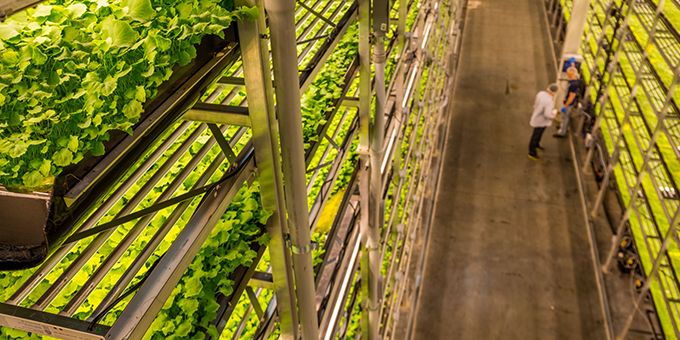The Vertical Farming Program will consist of 10 vertical farms throughout Jersey City located in senior centers, schools, public housing complexes, and municipal buildings. The 10 sites will grow 19,000 pounds of vegetables annually using water mist and minimal electricity.
 AeroFarms Partners To Launch First Vertical Farming Program Addressing Food Deserts, Inequity with Food Access & Education
AeroFarms Partners To Launch First Vertical Farming Program Addressing Food Deserts, Inequity with Food Access & Education

News From | AeroFarms
Jersey City Mayor, Steven M. Fulop, announced this week that the City of Jersey City will be moving forward with the 1st in the nation municipal vertical farming program in conjunction with AeroFarms and World Economic Forum, who recently selected Jersey City as their first partner in the Healthy Cities and Communities 2030 Initiatives.
“The Mayor and I were both selected as Young Global Leaders by the World Economic Forum and while we have known each other for years I’m excited to work with Jersey City in this formal capacity,” said David Rosenberg, CEO of AeroFarms. “Societies’ structural food problems have become more clear with COVID-19. The world needs more distributed, localized food production systems. We also need new ways to get healthy food to our most disadvantaged members of society. I am honored to work to work with Mayor Fulop and the people of Jersey City to find better solutions.”
The Vertical Farming Program will consist of 10 vertical farms throughout Jersey City located in senior centers, schools, public housing complexes, and municipal buildings. The 10 sites will grow 19,000 pounds of vegetables annually using water mist and minimal electricity. The food will be free to the public.
The program is part of the broader initiative from the World Economic Forum towards partnerships with cities. Earlier this year the World Economic Forum selected 4 cities (Moscow, Mumbai, Austin, Jersey City) to launch the Healthy City 2030 initiative, which will target measurable changes to the health of each community.
“The Healthy Cities and Communities initiative is a flagship effort of the World Economic Forum. In collaboration with both private-public sector stakeholders, the initiative aims to catalyze new ecosystems that will enable socially vibrant and health and well-being centric cities and communities,” said Mayuri Ghosh, Head of the Healthy Cities and Communities initiative at the World Economic Forum. “Establishing a secure supply of nutritious food via locally sourced vertically farmed greens in collaboration with Aerofarms has been a key accomplishment of the Forum’s partnership with Jersey City. The shared insights will be incorporated into efforts underway in other global cities.”
The vertical farming program with AeroFarms and the World Economic Forum is the latest and broadest initiative Jersey City has launched around food access including more than 5,000 food market tours for seniors to educate on healthy eating, and the grant program on the “Healthy Corner Store” initiative.
“This partnership will allow us to provide thousands of pounds of locally-grown, nutritious foods that will help close the hunger gap and have an immeasurable impact on the overall health of our community,” Mayor Fulop said.
The content & opinions in this article are the author’s and do not necessarily represent the views of AgriTechTomorrow
Comments (0)
This post does not have any comments. Be the first to leave a comment below.
Featured Product

